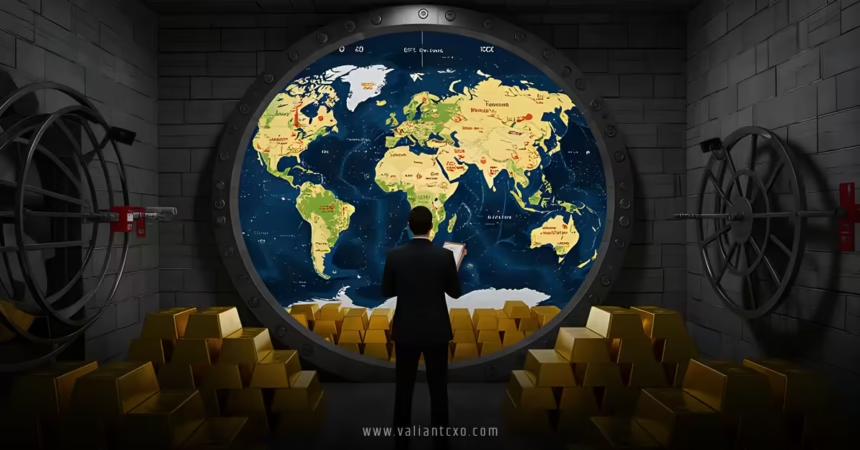Geopolitics Meets Finance: How Tariffs, AI, and Crypto Are Reshaping the Global Economy is more than just a catchy phrase—it’s a seismic shift shaking the foundations of how money moves, markets operate, and nations compete. Imagine the global economy as a giant chessboard, where every move by a world leader, tech innovator, or crypto pioneer sends ripples across continents. Tariffs are like walls, redirecting trade flows; AI is the master strategist, predicting and optimizing every play; and cryptocurrencies? They’re the wildcards, rewriting the rules of financial power. Let’s dive into this fascinating intersection and uncover how these forces are transforming our world.
The Geopolitical Chessboard: Why It Matters to Finance
Geopolitics isn’t just about border disputes or diplomatic summits—it’s the invisible hand steering financial markets. When nations flex their muscles through policies like tariffs, entire economies feel the impact. But how does this connect to your bank account or the stock market? Geopolitics Meets Finance: How Tariffs, AI, and Crypto Are Reshaping the Global Economy shows us that political decisions ripple through supply chains, inflation rates, and even the value of your digital wallet.
Tariffs: The Economic Walls Dividing Nations
Tariffs are like toll booths on the highway of global trade. When a country slaps a tax on imports, it’s not just about protecting local industries—it’s a power move. Take the U.S.-China trade war that kicked off in 2018. The U.S. imposed tariffs on over $360 billion of Chinese goods, and China retaliated with its own levies. The result? Higher prices for consumers, disrupted supply chains, and a scramble to find new markets.
Why does this matter? Because tariffs don’t just raise the cost of your phone or sneakers—they shift entire economies. Companies rethink where they manufacture goods, countries form new trade alliances, and suddenly, places like Vietnam or Mexico become hot spots for factories. Geopolitics Meets Finance: How Tariffs, AI, and Crypto Are Reshaping the Global Economy highlights how these barriers force businesses to adapt, often at a steep cost.
The Ripple Effects of Trade Barriers
Think of tariffs as pebbles dropped in a pond. The splash is immediate—higher costs for imported goods—but the ripples keep going. Manufacturers pass costs to consumers, inflation creeps up, and central banks might hike interest rates to cool things down. For investors, this means volatility. A tariff announcement can tank stock prices in one sector while boosting another. For example, U.S. tariffs on Chinese steel in 2018 gave a temporary lift to American steelmakers but hit automakers hard due to higher input costs.
Geopolitics Meets Finance: How Tariffs, AI, and Crypto Are Reshaping the Global Economy isn’t just about trade wars, though. It’s about how nations use economic tools to assert dominance, and how businesses and investors must navigate this new reality.
AI: The Brain Behind the Financial Revolution
If tariffs are the muscle of geopolitics, artificial intelligence is the brain. AI is transforming finance faster than you can say “algorithm.” From Wall Street trading floors to your budgeting app, AI is crunching numbers, spotting patterns, and making decisions at lightning speed. But how does Geopolitics Meets Finance: How Tariffs, AI, and Crypto Are Reshaping the Global Economy tie AI to global power plays?
AI in Finance: Smarter Markets, Smarter Risks
AI’s ability to process massive datasets makes it a game-changer. High-frequency trading firms use AI to execute thousands of trades per second, capitalizing on tiny price fluctuations. Meanwhile, banks like JPMorgan use AI to detect fraud, saving billions annually. But here’s the kicker: AI isn’t just a tool for profit—it’s a geopolitical weapon.
Countries are racing to dominate AI development. The U.S., China, and the EU are pouring billions into AI research, knowing that whoever controls AI controls the future of finance. Why? Because AI can predict market trends, optimize supply chains disrupted by tariffs, and even assess the impact of geopolitical events in real-time. Geopolitics Meets Finance: How Tariffs, AI, and Crypto Are Reshaping the Global Economy shows us that AI is the bridge between political strategy and economic outcomes.
The Dark Side of AI in Finance
But AI isn’t all rosy. Ever heard of a “flash crash”? In 2010, the U.S. stock market plummeted 9% in minutes, partly due to AI-driven trading gone haywire. As AI becomes more autonomous, the risks grow—missteps can amplify market chaos. Plus, there’s the geopolitical angle: nations with advanced AI can manipulate markets or destabilize rivals’ economies. Imagine a rogue AI influencing currency values during a trade war. Scary, right?
Cryptocurrencies: The Wildcard of Global Finance
Now, let’s talk about the rebel of the financial world: cryptocurrencies. Bitcoin, Ethereum, and thousands of altcoins are rewriting the rules of money. But Geopolitics Meets Finance: How Tariffs, AI, and Crypto Are Reshaping the Global Economy reveals that crypto isn’t just about buying coffee with Bitcoin—it’s a geopolitical force.
Crypto as a Financial Escape Hatch
Cryptocurrencies thrive in chaos. When tariffs disrupt trade or sanctions cut off countries from global banking, crypto offers a way out. Take Venezuela: crippled by U.S. sanctions, its citizens turned to Bitcoin to bypass currency controls. Crypto’s decentralized nature makes it a lifeline for individuals and even nations under economic siege.
But it’s not just about dodging sanctions. Crypto is reshaping global finance by challenging central banks. Imagine a world where you don’t need a bank to send money across borders. Blockchain technology makes this possible, cutting out middlemen and reducing costs. Geopolitics Meets Finance: How Tariffs, AI, and Crypto Are Reshaping the Global Economy underscores how crypto empowers individuals while threatening traditional financial systems.
The Regulatory Tug-of-War
Here’s where geopolitics crashes the crypto party. Governments love control, and crypto’s wild west vibe makes them nervous. China banned crypto trading outright in 2021, while the U.S. is still figuring out how to regulate it without stifling innovation. Meanwhile, countries like El Salvador are going all-in, making Bitcoin legal tender. This patchwork of regulations creates a fragmented global market, where crypto’s value swings based on the latest geopolitical headline.
Geopolitics Meets Finance: How Tariffs, AI, and Crypto Are Reshaping the Global Economy isn’t just about technology—it’s about power. Who controls the rules of crypto controls its future, and nations are fighting tooth and nail for that dominance.
The Intersection: Where Tariffs, AI, and Crypto Collide
So, how do these three forces—tariffs, AI, and crypto—interact? Picture a three-way tug-of-war. Tariffs create economic friction, AI optimizes responses to that friction, and crypto offers a way to sidestep it entirely. Together, they’re rewriting the global economic playbook.
Case Study: Supply Chain Chaos and Solutions
Let’s zoom in on supply chains. Tariffs, like those between the U.S. and China, disrupt the flow of goods. Companies turn to AI to reroute shipments, predict costs, and find new suppliers. But what about payment? Crypto steps in, enabling cross-border transactions without relying on sanctioned banks. Geopolitics Meets Finance: How Tariffs, AI, and Crypto Are Reshaping the Global Economy shows how these tools work in tandem to keep the world spinning.
For example, during the 2020 pandemic, supply chain snarls hit hard. AI helped companies like Walmart optimize inventory, while crypto startups facilitated payments to suppliers in hard-to-reach markets. This synergy is the future of global trade.
The Risks of a Hyper-Connected World
But there’s a flip side. The more we rely on AI and crypto, the more vulnerable we become. A single AI glitch could crash markets, while a crypto hack could wipe out billions. Add tariffs to the mix, and you’ve got a recipe for volatility. Geopolitics Meets Finance: How Tariffs, AI, and Crypto Are Reshaping the Global Economy warns us to tread carefully in this brave new world.
The Role of Individuals in This New Economy
You might be thinking, “This is all big-picture stuff—how does it affect me?” Great question! Geopolitics Meets Finance: How Tariffs, AI, and Crypto Are Reshaping the Global Economy isn’t just about nations and corporations—it’s about you. Tariffs raise the price of your groceries. AI decides whether you get that loan. Crypto could be your ticket to financial freedom or a risky bet gone wrong.
Navigating the New Financial Landscape
So, how do you thrive in this shifting economy? Stay informed. Learn how tariffs affect the brands you buy. Explore AI-driven tools like robo-advisors to grow your wealth. Dip your toes into crypto, but don’t dive in headfirst—start small and research thoroughly. The World Trade Organization offers insights into global trade policies, while CoinDesk keeps you updated on crypto trends. For AI, check out MIT Technology Review for cutting-edge developments.
Conclusion: Embracing the Future of Geopolitics and Finance
Geopolitics Meets Finance: How Tariffs, AI, and Crypto Are Reshaping the Global Economy is more than a trend—it’s the blueprint for our financial future. Tariffs are redrawing trade maps, AI is revolutionizing decision-making, and crypto is challenging the very concept of money. Together, they’re creating a world that’s more connected, yet more complex, than ever before. By understanding these forces, you can navigate the chaos, seize opportunities, and build a brighter financial future. So, are you ready to play this global chess game?
FAQs
1. How do tariffs impact my daily finances in the context of Geopolitics Meets Finance: How Tariffs, AI, and Crypto Are Reshaping the Global Economy?
Tariffs increase the cost of imported goods, like electronics or clothing, which can raise prices at your local store. They also affect jobs by shifting industries, impacting your income or investments.
2. Can AI really predict market trends accurately?
AI analyzes vast datasets to spot patterns, but it’s not foolproof. Geopolitics Meets Finance: How Tariffs, AI, and Crypto Are Reshaping the Global Economy shows AI’s power, but human oversight is key to avoid errors.
3. Is cryptocurrency a safe investment given geopolitical tensions?
Crypto can be a hedge against instability, but it’s volatile. Regulatory changes, as seen in Geopolitics Meets Finance: How Tariffs, AI, and Crypto Are Reshaping the Global Economy, add risk, so diversify and research.
4. How do AI and crypto work together in global finance?
AI optimizes crypto trading and blockchain security, while crypto enables fast, borderless payments. Geopolitics Meets Finance: How Tariffs, AI, and Crypto Are Reshaping the Global Economy highlights their synergy in bypassing traditional systems.
5. What can I do to stay ahead in this new economic landscape?
Stay informed on tariffs, use AI tools for budgeting, and explore crypto cautiously. Follow trusted sources to understand Geopolitics Meets Finance: How Tariffs, AI, and Crypto Are Reshaping the Global Economy.
Click Here:valiantcxo.com


